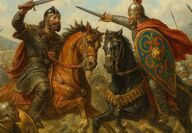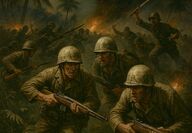Sorted by date Results 9 - 33 of 251

Introduction In the annals of English history, few years are as pivotal as 1066. This was the year when William, Duke of Normandy-known in his own time as William the Bastard-crossed the English Channel and began the Norman Conquest. His invasion not only transformed the political landscape of England but also left a profound and lasting legacy on the country's society, language, and culture. This article explores the context, events, and consequences of William's historic campaign. The...

On September 27, 489, the fate of Italy tilted dramatically as two rival kings-Odoacer and Theodoric-clashed near Verona in a decisive battle that would shape the future of the peninsula and the legacy of the Western Roman Empire. The confrontation, known as the Battle of Verona, marked the second major defeat for Odoacer at the hands of Theodoric and signaled the beginning of the Ostrogothic ascendancy in Italy. Background: The Collapse of Roman Authority By the late 5th century, the Western...

On October 1, 1800, a quiet diplomatic agreement in Europe reshaped the future of North America. Through the secret Treaty of San Ildefonso, Spain ceded the vast Louisiana Territory back to France, setting the stage for one of the most consequential land transfers in American history. A Secret Deal with Global Ripples Negotiated between Spain's King Charles IV and France's First Consul Napoleon Bonaparte, the treaty was part of a broader European power shuffle. Spain, weakened by war and...

October 2, 1941 - Eastern Front, World War II - In the early hours of October 2, 1941, Nazi Germany launched Operation Typhoon, a massive military campaign aimed at capturing Moscow and delivering a decisive blow to the Soviet Union. The offensive marked the final phase of Germany's summer campaign on the Eastern Front and represented Adolf Hitler's belief that seizing the Soviet capital would collapse Soviet resistance and end the war in the east. 🔹 Strategic Ambitions Operation Typhoon was de...

September 24, 2025 - WEST POINT, NY - Few moments in American history have resonated with the sense of betrayal as deeply as the flight of Benedict Arnold to the British Army lines following the exposure of his plot to surrender the fortress at West Point. The arrest of British Major John André was the linchpin that revealed the treacherous scheme and sent Arnold fleeing to safety behind enemy lines. This episode not only shifted the course of the Revolutionary War but also carved Arnold's...

September 23, 1803 - THe Battle of Assaye was fought paving the way for English rule of India. Introduction The early nineteenth century in India was a time of profound upheaval, marked by the collision of indigenous empires and foreign colonial powers. Within this crucible, the Battle of Assaye, fought on September 23, 1803, emerged as a pivotal moment in the Second Anglo-Maratha War. This fierce engagement between the British East India Company and the Maratha Empire not only showcased the tac...

On September 20, 1979, a swift and bloodless coup d'état dismantled one of Africa's most extravagant and controversial regimes. Emperor Jean-Bédel Bokassa I, ruler of the Central African Empire, was overthrown in a French-backed operation that restored republican governance and ended a three-year imperial experiment that had alienated citizens and international allies alike. From President to Emperor: Bokassa's Rise Jean-Bédel Bokassa, a former captain in the French Colonial Army, seized po...

On September 21, 1860, the Anglo-French alliance delivered a crushing defeat to Qing Dynasty forces at the Battle of Palikao, a turning point in the Second Opium War that paved the way for the fall of Beijing and the imposition of humiliating terms on China. Fought at the bridge of Baliqiao (Palikao), just east of the imperial capital, the battle showcased the stark military disparity between Western powers and the Qing Empire, and marked the climax of a conflict rooted in trade, sovereignty,...

In the early hours of September 16, 1812, a blaze erupted in Moscow that would become one of the most devastating urban fires in European history. Within days, three-quarters of the city lay in ruins, consumed by flames that raged from September 14 to 18 during Napoleon Bonaparte's ill-fated Russian campaign. A City Abandoned, a Fire Unleashed The fire began shortly after Napoleon's Grande Armée entered Moscow on September 14, following the brutal Battle of Borodino. Russian forces, under...

September 22, 1866 - Curupaity, Paraguay - Conflict: War of the Triple Alliance (1864–1870) Strategic Context By late 1866, the War of the Triple Alliance-pitting Paraguay against Brazil, Argentina, and Uruguay-had devolved into a brutal campaign of attrition. The Allies had made bloody gains toward the Paraguayan fortress of Humaitá, but their momentum stalled at Curupaity, where Paraguayan General José Eduvigis Díaz had fortified a 2,000-yard trench line with 49 cannons and Congreve rock...

On September 19, 1676, the colonial capital of Jamestown, Virginia, was engulfed in flames. The torchbearers were not foreign invaders or Native warriors, but fellow English colonists-rebels led by Nathaniel Bacon. This dramatic act of destruction marked the climax of Bacon's Rebellion, a volatile uprising that exposed deep fractures in colonial society and foreshadowed future American revolts against entrenched power. The Roots of Rebellion Bacon's Rebellion was born of frustration, inequality,...

September 9, 9 AD - Germania Magna -- In the dense, rain-soaked woodlands of northern Germania, a coalition of six Germanic tribes led by the Cheruscan noble Arminius executed one of the most devastating ambushes in Roman military history. Over the course of four brutal days, three elite Roman legions under Publius Quinctilius Varus were annihilated in what became known as the Battle of the Teutoburg Forest-a catastrophe so profound that it halted Roman expansion east of the Rhine for...

On the solemn occasion of the 62nd anniversary of the bombing of the 16th Street Baptist Church in Birmingham, Alabama, U.S. Representative Terri Sewell (AL-07) took to social media to share a moving video commemorating the tragedy and honoring the memory of the Four Little Girls whose lives were lost that day. The events of September 15, 1963 remain etched in the collective conscience of the nation, serving as a painful yet pivotal moment in the struggle for civil rights. The attack, carried...

On September 15, 2008, the unthinkable happened: Lehman Brothers, a 158-year-old financial institution and one of Wall Street's most storied investment banks, filed for Chapter 11 bankruptcy protection. As the largest bankruptcy filing in U.S. history, with over $600 billion in assets, the collapse of Lehman Brothers sent shockwaves through the global financial system, signaling the apex of the 2008 financial crisis. This historic event did not merely mark the end of an era for a single bank,...

On the morning of September 14, 1901, the United States awoke to the devastating news that President William McKinley had died from wounds sustained in an assassination attempt eight days earlier. His death marked the third time a sitting U.S. president had been assassinated, following Abraham Lincoln in 1865 and James A. Garfield in 1881. The tragedy not only plunged the nation into mourning but also ushered in a new and transformative chapter in American leadership with the sudden ascension...

On the morning of September 10, 1963, in the heart of Alabama, a quiet yet earthshaking revolution unfolded. Twenty Black students, ranging from elementary to high school age, entered previously all-White public schools across several Alabama cities. Their steps echoed not only in the hallways of those schools but across the nation, marking a turning point in the struggle for civil rights and the ongoing battle to desegregate public education in the American South. Background: The Fight for...

U.S. Marines Hold the Line at Henderson Field in Pivotal Guadalcanal Clash GUADALCANAL, SOLOMON ISLANDS - September 12, 1942 Under the cover of moonlight and jungle canopy, the Battle of Edson's Ridge-also known as Bloody Ridge-erupted on Guadalcanal as Imperial Japanese Army forces launched a fierce assault against U.S. Marines defending Henderson Field. This brutal engagement marked a turning point in the Guadalcanal campaign and became one of the most heroic stands in Marine Corps history....

September 11, 2025 - LEEDS, AL - Today marks 24 years since the terrorist attacks of September 11, 2001-a day that forever altered the course of American history and left an indelible mark on the national conscience. Across Alabama and the nation, communities are gathering to honor the nearly 3,000 lives lost and the countless others forever changed by the events of that morning. At 8:46 a.m. Eastern Time, the first plane struck the North Tower of the World Trade Center. Seventeen minutes...

On August 29, 1833, the British Parliament passed one of the most transformative pieces of legislation in its history: the Slavery Abolition Act. This act marked the formal end of slavery in most parts of the British Empire, freeing more than 800,000 enslaved Africans across the Caribbean, South Africa, and Canada. Though the road to abolition was long and fraught with resistance, the act represented a monumental shift in moral, economic, and political thinking-and laid the groundwork for future...

The morning of September 11, 2001, started like any other Tuesday. People were heading to work, children were in school, and the sky was a clear, brilliant blue. But by the end of the day, the world had irrevocably changed. The coordinated terrorist attacks on the United States, carried out by 19 al-Qaeda hijackers, left an indelible mark on the nation and the world. Remembering 9/11 isn't just about recalling a tragic event; it's about honoring the victims, understanding the global shifts that...

In the waning years of the 4th century, the Roman Empire was fractured not just politically but spiritually. The Eastern Roman Emperor Theodosius I, a staunch Christian, faced off against Eugenius, a usurper backed by the powerful Frankish general Arbogast, who had seized control of the Western Empire after the suspicious death of Emperor Valentinian II in 392. Though Eugenius was not a pagan himself, his regime became a rallying point for Rome's traditional religious elites. Pagan temples were...

On September 5, 1914, the fate of France-and perhaps all of Europe-hung in the balance. German forces, executing the ambitious Schlieffen Plan, had swept through Belgium and northeastern France, pushing Allied troops into a desperate retreat. Paris was just 30 miles away from falling into enemy hands. But what unfolded over the next week would become one of the most pivotal moments in World War I: the First Battle of the Marne, a dramatic counteroffensive that halted the German advance and...

On September 4, 1996, Colombia's long-running internal conflict took a violent turn when the Revolutionary Armed Forces of Colombia (FARC) launched a coordinated attack on a military base in the southern department of Guaviare. The assault marked the beginning of a brutal three-week guerrilla campaign that left at least 130 Colombians dead. It was one of the deadliest escalations in the country's decades-long struggle with insurgency, drug trafficking, and political instability. The Attack and...

Although not an “abolitionist” in the strict sense, Abraham Lincoln opposed the expansion of slavery. Lincoln’s view was common within the Republican Party. Abolitionists were generally despised in both North and South--many would be considered radical even by today’s abysmal moral standards. Abolitionists, e.g., Wendell Phillips and Lysander Spooner routinely criticized Lincoln for his tepid anti-slavery views. Lincoln’s focus was on maintaining the geographical Union--slavery was a secondary...

World War II ended 80 years ago. But, before any peace dividend could be paid or the euphoria fully experienced, the Cold War started. Victory in the total defeat of the Third Reich and the Empire of Japan failed to usher in a new world order for peace, prosperity or universal rights. To the Russians, the defeat of the Nazis was not an end, but an opportunity to assert itself and insert an ideology that used peace as an opportunity for conquest. This shocked many in the West who believed Stalin...